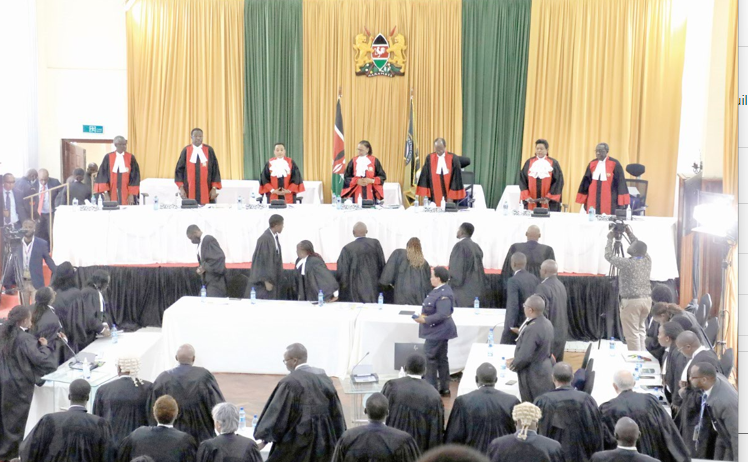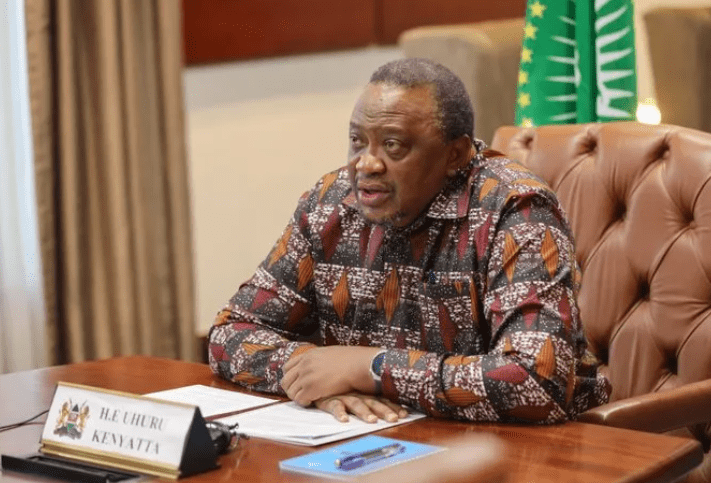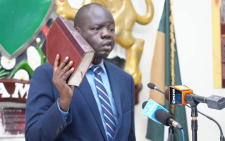Ruto blow as top court refers pension case to appeal tribunal

It is a major win for more than 6,000 pensioners after the Supreme Court yesterday overturned Court of Appeal decision allowing President William Ruto’s administration to increase the mandatory pension contributions under the National Social Security Fund (NSSF) scheme.
The judgement delivered by seven judges of the apex court led by Chief Justice Martha Koome noted the Court of Appeal erred in its decision by overturning a finding issued by the Employment and Labour Relations Court (ELRC) on the basis the Labour court lacked jurisdiction to invalidate NSSF Act No. 45 of 2013 for being unconstitutional.
The country’s top court set aside the wrongful interpretation of the jurisdiction of ELRC by the Appellant tribunal, saying that the labour court has express jurisdiction to determine the constitutionality of a statute in matters employment and labour.
“The consolidated appeal is hereby allowed on the narrow ground that the ELRC had jurisdiction to determine the constitutional validity of the NSSF Act 2013,” the Supreme Court judges stated.
Restrictive interpretation
While annulling the Court of Appeal decision that had found ELRC had no jurisdiction to handle the case on NSSF Act, the Koome-led bench called the interpretation by the Court of Appeal as a restrictive interpretation of labour relations.
“To the specific question whether the ELRC correctly assumed jurisdiction to determine the constitutional validity of the NSSF Act 2013. We are persuaded by the appellants’ argument to the effect that the Court of Appeal adopted a rather restrictive view of the reach of the NSSF Act 2013, in holding that the matter before the ELRC did not emanate from an “employer-employee” dispute,” The Supreme court judges said.
According to the apex court judges, the extensive provisions of the Act requiring employers and employees to contribute specific amounts of money to a social security fund cannot be said to have nothing to do with an employer-employee relationship.
“Even if the matter did not emanate from an employer-employee dispute within the confines of the ELRC Act, to the extent that it introduces enhanced and mandatory contributory amounts of employee earnings, the Act has potential to ignite justiciable grievances from certain cadres of employees.
“No doubt these grievances would end up at the ELRC which would likely be called upon, as it was in this case, to determine the constitutional validity of the same. But even beyond the employer-employee dispute resolution regime, the NSSF Act 2013, seeks to expansively regulate a wide array of labour relations, especially the social security of the employed cadre when they finally exit formal employment,” the seven judges said.
Koome, her deputy Philomena Mwilu and Justices Mohamed Ibrahim, Smokin Wanjala, Njoki Ndung’u, Isaac Lenaola and William Ouko concurred with the Kenya Tea Growers Association, Agricultural Employers’ Association and over 6,000 pension from County Pensioners Association that the once the Court of Appeal found that ELRC had no jurisdiction it would have not; gone ahead and determined the merits of the appeal by the Attorney General, NSSF Board of Trustees, the Retirement Benefits Authority and the Federation of Kenya Employees (FKE).
“The Appellate Court could not pronounce itself on the merits of the trial court’s findings. It had to down its tools and remit the matter to the court that had jurisdiction, in this case, the High Court. However, instead of remitting the matter as aforesaid, the Appellate Court went on to determine the merits of one issue, while leaving the others in abeyance,” Chief Justice Koome led bench stated.
Consequently, the Supreme Court judges however has remitted the case back to the Court of Appeal to determine the substantive merits of the ELRC decision that invalidated the 2013 NSSF act for being unconstitutional on an urgent priority basis.
As a result, the NSSF Act 2013 case, which has been dragged in court for more than nine years regarding its legality, will continue. Last year, the Court of Appeal allowed President Ruto’s administration to increase the mandatory pension contributions, arguing that the matter ought to have been determined by the High Court and not the ELRC. Three Appellate judges Hannah Okwengu, Mohamed Warsame and John Mativo set aside a High Court order declaring the NSSF Act 2013







